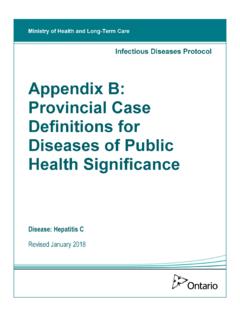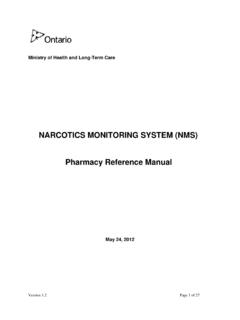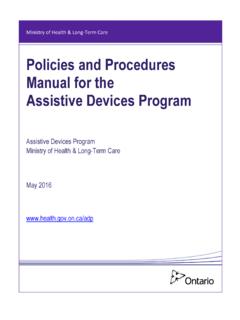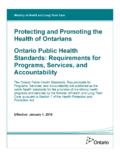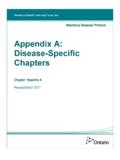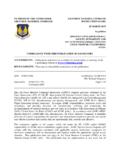Transcription of Recreational Water Protocol, 2018 - health.gov.on.ca
1 Ministry of Health and Long-Term Care Recreational Water Protocol, 2018. Population and Public Health Division, Ministry of Health and Long-Term Care Effective: January 1, 2018 or upon date of release Recreational Water Protocol, 2018. Preamble The Ontario Public Health Standards: Requirements for Programs, Services, and Accountability (Standards) are published by the Minister of Health and Long-Term Care under the authority of section 7 of the Health Protection and Promotion Act (HPPA) to specify the mandatory health programs and services provided by boards of ,2. The Standards identify the minimum expectations for public health programs and services. Boards of health are accountable for implementing the Standards including the protocols and guidelines that are referenced in the Standards.
2 Protocols are program and topic-specific documents incorporated into the Standards which provide direction on how boards of health shall operationalize specific requirement(s) identified within the Standards. Purpose The purpose of this protocol is to assist in the prevention and reduction of Water -borne illness and injury related to Recreational Water use by providing direction to boards of health on the delivery of local, comprehensive Recreational Water programs, which include, but are not limited to: Surveillance and inspection of public Recreational Water facilities, public beaches and waterfronts that are part of a Recreational camp;. Investigation of, and response to, adverse events and complaints at public Recreational Water facilities, public beaches and waterfronts that are part of a Recreational camp, and communication strategies for the public and facility owner/operators.
3 Promoting awareness of safe use and operation of public Recreational Water facilities, public beaches and waterfronts that are part of a Recreational camp, and training of owner/operators of public Recreational Water facilities and camps; and Legislation and regulations that are relevant to this protocol include: Public Pools regulation under the HPPA including spas and other Recreational Water ;2-4. Recreational Camps under HPPA;2,5. Health Protection and Promotion Act, RSO 1990, c , s 1 (1);2 and Ontario Building Code regulation, , Reference to the Standards This section identifies the standards and requirements to which this protocol relates. Effective Public Health Practice Requirement 9. The board of health shall publicly disclose results of all inspections or information in accordance with the Electronic Cigarettes Protocol, 2018 (or as current).
4 The Food Safety Protocol, 2018 (or as current); the Health Hazard Response Protocol, 2. Recreational Water Protocol, 2018. 2018 (or as current); the Infection Prevention and Control Complaint Protocol, 2018 (or as current); the Infection Prevention and Control Disclosure Protocol, 2018 (or as current); the Infection Prevention and Control Protocol, 2018 (or as current); the Recreational Water Protocol, 2018 (or as current); the Safe Drinking Water and Fluoride Monitoring Protocol, 2018 (or as current); the Tanning Beds Protocol, 2018 (or as current); and the Tobacco Protocol, 2018 (or as current). Safe Water Requirement 1. The board of health shall: a) Conduct surveillance of: Drinking Water systems and associated illnesses, risk factors, and emerging trends.
5 Public beaches and Water -borne illnesses associated with Recreational Water , risk factors, and emerging trends; and Recreational Water facilities;. b) Conduct epidemiological analysis of surveillance data, including monitoring of trends over time, emerging trends, and priority populations; and c) Use the information obtained to inform safe Water programs and services in accordance with the Infectious Diseases Protocol, 2018 (or as current); the Population Health Assessment and Surveillance Protocol, 2018 (or as current); the Recreational Water Protocol, 2018 (or as current); the Safe Drinking Water and Fluoride Monitoring Protocol, 2018 (or as current); and the Small Drinking Water Systems Risk Assessment Guideline, 2018 (or as current).
6 Requirement 3. The board of health shall ensure the availability of education and training for owners/operators of small drinking Water systems and Recreational Water facilities in accordance with the Operational Approaches for Recreational Water Guideline, 2018 (or as current); the Recreational Water Protocol, 2018 (or as current);. the Safe Drinking Water and Fluoride Monitoring Protocol, 2018 (or as current); and the Small Drinking Water Systems Risk Assessment Guideline, 2018 (or as current). Requirement 5. The board of health shall provide all the components of the Safe Water Program in accordance with: a) The Safe Drinking Water and Fluoride Monitoring Protocol, 2018 (or as current) and all applicable statutes and regulations to protect the public from exposure to unsafe drinking Water ; and b) The Operational Approaches for Recreational Water Guideline, 2018 (or as current).
7 And the Recreational Water Protocol, 2018 (or as current), to reduce the risks of illness and injuries at public beaches and Recreational Water facilities. Requirement 8. The board of health shall ensure 24/7 availability to receive reports of and respond to: a) Adverse events related to safe Water , such as reports of adverse drinking Water of drinking Water systems, governed under the Health Protection and Promotion Act or the Safe Drinking Water Act, 2002;. 3. Recreational Water Protocol, 2018. b) Reports of Water -borne illnesses or outbreaks;. c) Safe Water issues arising from floods, fires, power outages, or other situations that may affect Water safety; and d) Safe Water issues relating to Recreational Water use including public beaches in accordance with the Infectious Diseases Protocol, 2018 (or as current); Operational Approaches for Recreational Water Guideline, 2018 (or as current); the Recreational Water Protocol, 2018 (or as current); the Safe Drinking Water and Fluoride Monitoring Protocol, 2018 (or as current); and the Small Drinking Water Systems Risk Assessment Guideline, 2018 (or as current).
8 Operational Roles and Responsibilities Surveillance and inspection Inventory of public Recreational Water facilities, public beaches and Recreational camp waterfronts 1) The board of health shall maintain a current inventory or inventories of all public Recreational Water facilities and Recreational camp waterfront areas within the health unit, and public beaches within the health unit, as defined in this protocol: a) Public Recreational Water facilities;. b) Recreational camp waterfront areas;. c) Public beaches; * and d) Public beach areas within provincial parks.. Assessment and inspection of public Recreational Water facilities and public beaches 1) Inspections of public Recreational Water facilities carried out by boards of health shall include but are not limited to: a) Observations to determine compliance with applicable facility and Water safety regulations under the HPPA; including the review of test logs and response procedures;2.
9 B) Testing Water quality parameters and collection of Water samples, as applicable and as deemed necessary; and c) Communication of inspection results and, if applicable, requirements to the owner or operator of the Recreational Water facility. Public pools and public spas 1) The board of health shall: *. The board of health is not responsible for routine monitoring of private residential beaches.. Public beach areas within provincial parks are monitored and managed by the Ministry of Natural Resources and Forestry in consultation with the board of health. 4. Recreational Water Protocol, 2018. a) Upon notification, inspect public pools and public spas prior to opening or reopening after construction, alteration, or closure of more than four weeks to determine compliance with Ontario regulation 565 and 428/05 respectively;3,4.
10 B) Inspect public pools, and public spas that are open year-round at least once every three months while operating to determine compliance with Ontario regulation 565. and 428/05 respectively; , 3,4. c) Inspect seasonal public pools and public spas that are open only part of the year at least once every three months while operating to determine compliance with Ontario regulation 565 and 428/05 respectively;3,4. d) Inspect public pools and public spas that are open for a short period of time ( , less than 4 weeks) at least once per year to determine compliance with Ontario regulation 565 and 428/05 respectively;3,4 and e) Conduct additional inspections of public pools and public spas as necessary to address non-compliance with Ontario regulation 565 and 428/05 respectively, observed during previous inspection(s); to investigate complaints and/or reports of illness, injury or death; and/or to monitor the safety of the ,4.
